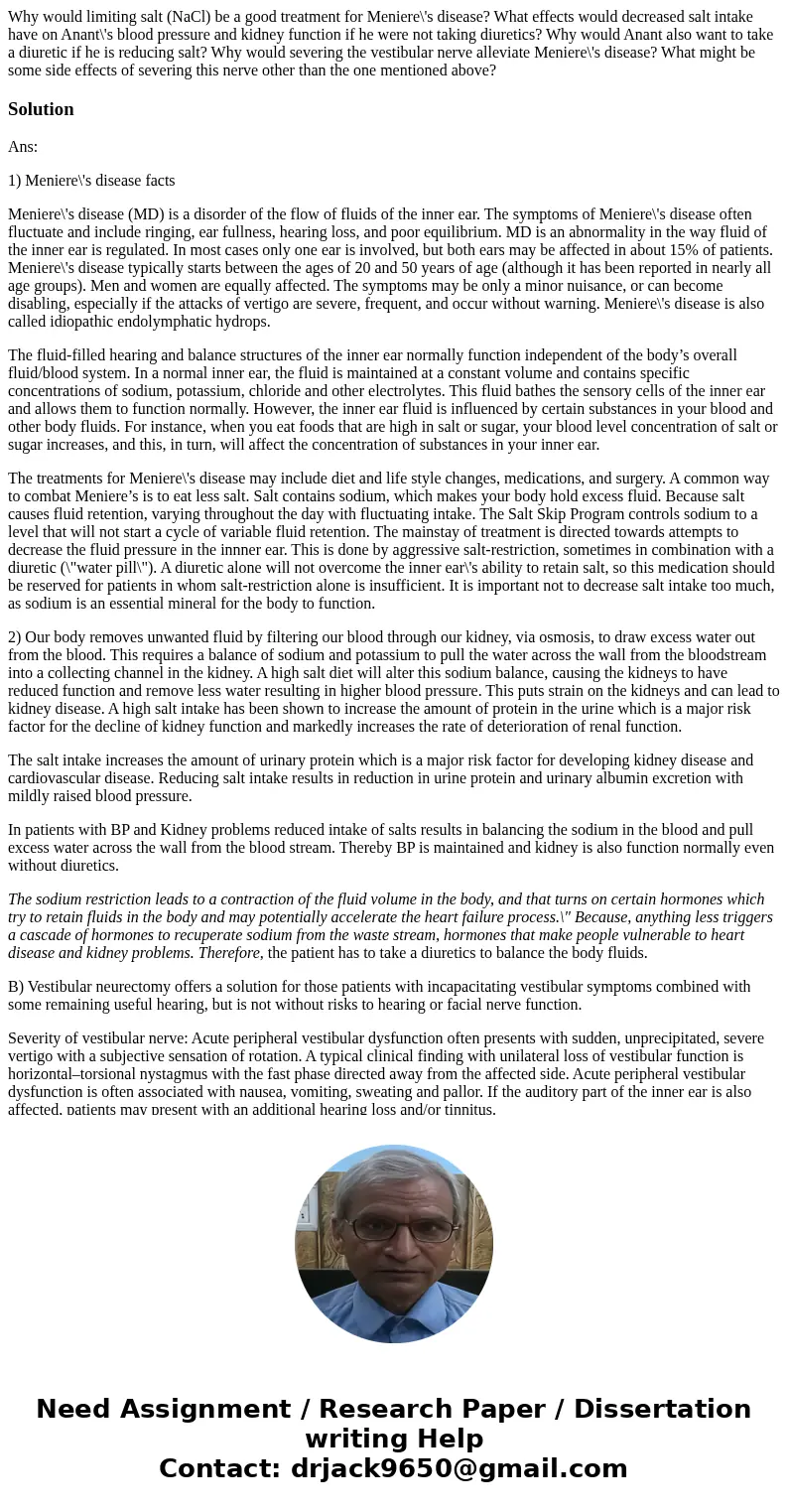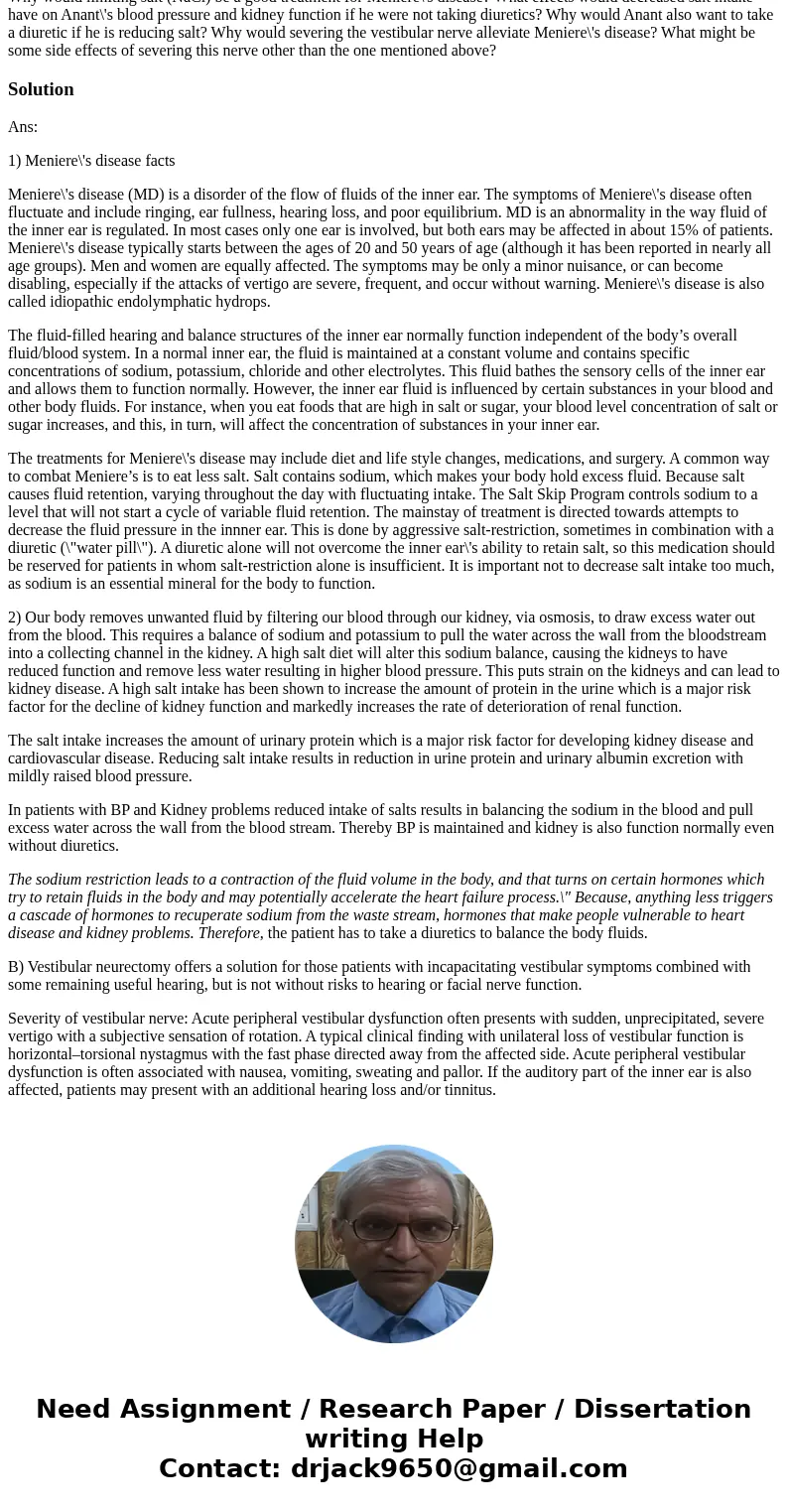Why would limiting salt NaCl be a good treatment for Meniere
Solution
Ans:
1) Meniere\'s disease facts
Meniere\'s disease (MD) is a disorder of the flow of fluids of the inner ear. The symptoms of Meniere\'s disease often fluctuate and include ringing, ear fullness, hearing loss, and poor equilibrium. MD is an abnormality in the way fluid of the inner ear is regulated. In most cases only one ear is involved, but both ears may be affected in about 15% of patients. Meniere\'s disease typically starts between the ages of 20 and 50 years of age (although it has been reported in nearly all age groups). Men and women are equally affected. The symptoms may be only a minor nuisance, or can become disabling, especially if the attacks of vertigo are severe, frequent, and occur without warning. Meniere\'s disease is also called idiopathic endolymphatic hydrops.
The fluid-filled hearing and balance structures of the inner ear normally function independent of the body’s overall fluid/blood system. In a normal inner ear, the fluid is maintained at a constant volume and contains specific concentrations of sodium, potassium, chloride and other electrolytes. This fluid bathes the sensory cells of the inner ear and allows them to function normally. However, the inner ear fluid is influenced by certain substances in your blood and other body fluids. For instance, when you eat foods that are high in salt or sugar, your blood level concentration of salt or sugar increases, and this, in turn, will affect the concentration of substances in your inner ear.
The treatments for Meniere\'s disease may include diet and life style changes, medications, and surgery. A common way to combat Meniere’s is to eat less salt. Salt contains sodium, which makes your body hold excess fluid. Because salt causes fluid retention, varying throughout the day with fluctuating intake. The Salt Skip Program controls sodium to a level that will not start a cycle of variable fluid retention. The mainstay of treatment is directed towards attempts to decrease the fluid pressure in the innner ear. This is done by aggressive salt-restriction, sometimes in combination with a diuretic (\"water pill\"). A diuretic alone will not overcome the inner ear\'s ability to retain salt, so this medication should be reserved for patients in whom salt-restriction alone is insufficient. It is important not to decrease salt intake too much, as sodium is an essential mineral for the body to function.
2) Our body removes unwanted fluid by filtering our blood through our kidney, via osmosis, to draw excess water out from the blood. This requires a balance of sodium and potassium to pull the water across the wall from the bloodstream into a collecting channel in the kidney. A high salt diet will alter this sodium balance, causing the kidneys to have reduced function and remove less water resulting in higher blood pressure. This puts strain on the kidneys and can lead to kidney disease. A high salt intake has been shown to increase the amount of protein in the urine which is a major risk factor for the decline of kidney function and markedly increases the rate of deterioration of renal function.
The salt intake increases the amount of urinary protein which is a major risk factor for developing kidney disease and cardiovascular disease. Reducing salt intake results in reduction in urine protein and urinary albumin excretion with mildly raised blood pressure.
In patients with BP and Kidney problems reduced intake of salts results in balancing the sodium in the blood and pull excess water across the wall from the blood stream. Thereby BP is maintained and kidney is also function normally even without diuretics.
The sodium restriction leads to a contraction of the fluid volume in the body, and that turns on certain hormones which try to retain fluids in the body and may potentially accelerate the heart failure process.\" Because, anything less triggers a cascade of hormones to recuperate sodium from the waste stream, hormones that make people vulnerable to heart disease and kidney problems. Therefore, the patient has to take a diuretics to balance the body fluids.
B) Vestibular neurectomy offers a solution for those patients with incapacitating vestibular symptoms combined with some remaining useful hearing, but is not without risks to hearing or facial nerve function.
Severity of vestibular nerve: Acute peripheral vestibular dysfunction often presents with sudden, unprecipitated, severe vertigo with a subjective sensation of rotation. A typical clinical finding with unilateral loss of vestibular function is horizontal–torsional nystagmus with the fast phase directed away from the affected side. Acute peripheral vestibular dysfunction is often associated with nausea, vomiting, sweating and pallor. If the auditory part of the inner ear is also affected, patients may present with an additional hearing loss and/or tinnitus.


 Homework Sourse
Homework Sourse